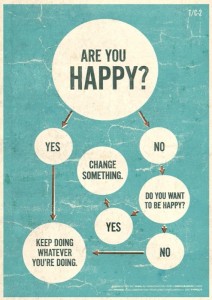 Businesses spend a lot of time and effort measuring worker productivity. Productivity gurus and books like Getting Things Done can tell you how to use a system of lists, file folders, and label makers to become incredibly efficient and get more things done each day than you ever thought was possible.
Businesses spend a lot of time and effort measuring worker productivity. Productivity gurus and books like Getting Things Done can tell you how to use a system of lists, file folders, and label makers to become incredibly efficient and get more things done each day than you ever thought was possible.
We’ve all become so focused on productivity that we’re working ourselves out of jobs. As more and more people involuntarily become entrepreneurs (after being laid off from a job or because the job they have doesn’t pay enough), the 40-hour work week has turned into an 80+ hour work week. Many of us are always thinking about work, checking our email, or worrying about hustling up more work even when we’re not getting paid and when there’s absolutely no reason to be doing so.
We think we’ve dodged the traditional corporate ladder but we’ve just replaced it with a self-employment and social media treadmill! The worst part is that many people still feel obligated to work 9 to 5 in addition to all the time they spend working after 8PM and on the weekends. This 9 to 5, weekends, late nights, and constant email checking has become the bare minimum amount required by many technology start ups. It’s become common knowledge that the self-employed are always working.
But, the point of course, is that we’re getting so much more done; faster than ever before, right?
We’re not machines. We have a limited amount of attention. We have interests outside of our work. We have to take care of ourselves.
For the rapidly growing entrepreneurial class, trying to create a balance of life and work can be very stressful as you try to keep one from encroaching on the other. This is not always possible.
The greatest part about being self-employed is the opportunity it gives you to design your ideal lifestyle — and it doesn’t need to look anything like a traditional 8 / 8 / 8 work / play / sleep schedule. The ideal situation is to find a way to get paid to do something you’re passionate about and to give up making distinctions between work and play. Even then, burnout happens if you don’t take time to recharge.
If you have the flexibility to determine when you’re working, be conscious of it and take advantage of that freedom. Figure out what the important things are that will get you where you want to be, and which things would be better handled by someone else. Set aside times when you aim to be working if there’s something important to do.
Imagine being able to answer the question, “What are you working on?” in one sentence, with perfect clarity.
Don’t just do more things.
